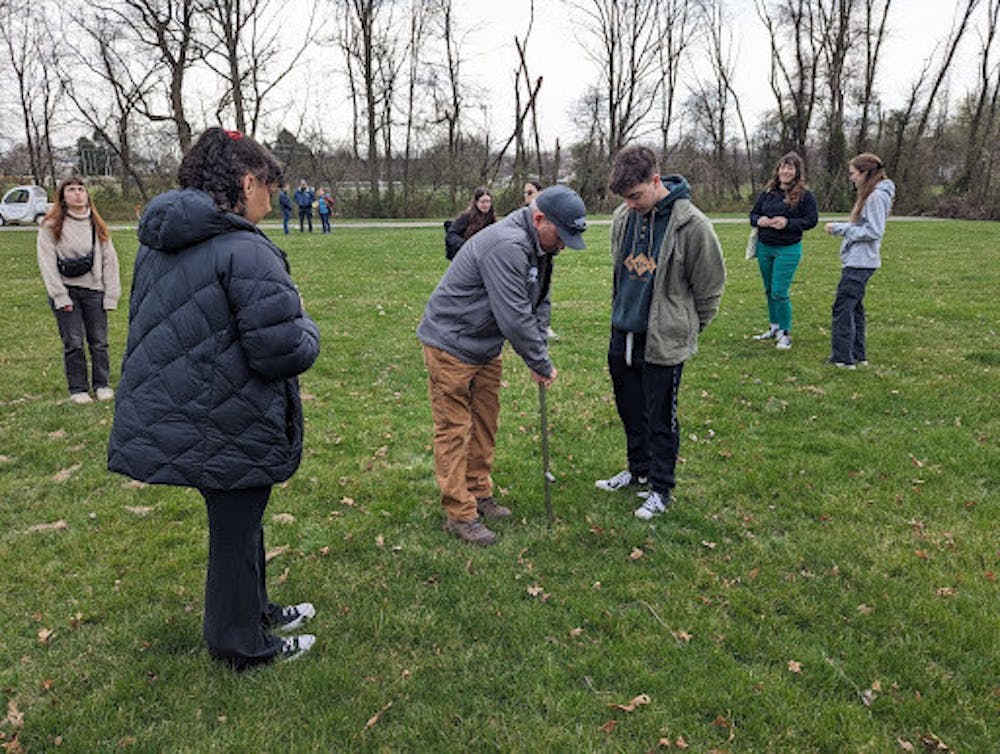By Jessica Samborsky
Staff Writer
TCNJ Organic Land Management is a campus campaign group on a mission to eliminate Roundup, a chemical weed killer that has been found to cause cancer, and switch to more sustainable and organic alternatives. They aim to prevent the usage of these chemical weed killers as they are a threat to human health and the environment.
Roundup is a glyphosate-based herbicide that was known to be “probably carcinogenic,” according to WHO's International Agency for Research on Cancer. Glyphosate has been associated with the cause of respiratory concerns. Furthermore, “Roundup can trigger loss of biodiversity, making ecosystems more vulnerable to pollution and climate change,” according to researchers from McGill University.
TCNJ Organic Land Management is led by senior biology and secondary education major Bryan Wood and graduate public health major and graduate assistant for Campus as a Living Lab Hanna Sutzman. Through their campaign known as RoundOut, has three demands in order to eliminate the use of Roundup and other chemical weed killers, which include:
1. Start the three-year pilot program and begin facilities education by April 2024, including circulating baseline chemical usage to students and the Environmental Sustainability Council.
2. Reach 10% organically managed campus land by August of 2028 (one year after the three year pilot).
3. Attain bronze certification for the Re:wild green ground by 2030 (50% of the campus being organically managed).
Re:wild Your Campus has created a certification that recognizes a school's transition to more organic and sustainable methods when dealing with the land they use. It uses the green grounds certification, which ranges from bronze to silver to gold and platinum. It involves reducing pesticide use, increasing biodiversity, reducing water use, improving soil health and more.
TCNJ Organic Land Management is currently trying to reach bronze certification for the campus, which means that 50% of campus managed areas on campus do not use pesticides and also follow the following criteria: "Campus has an integrated pest management plan or policy that indicates that synthetic pesticides should be used only as a last resort, and implements this policy.”
Jenna Needham, a freshman sociology major and researcher for TCNJ Organic Land Management, said she joined the group to make a difference.
“I felt that I could help the community eliminate Roundup and also take a stand in my community, which I felt I would be able to do in our course, Climate Justice and Social Action,” said Needham. “Without the course and Bryan Wood and Hanna Sutzman’s actions and words, I never would’ve become more involved.”
On March 25, TCNJ Organic Land Management held a tabling event in the lobby of the Social Sciences Building, receiving 20 signatures for its campaign.
Through tabling, they garnered some students interested in their baby planting event, held on March 29 past the bridge behind Decker. While planting baby plants, students were educated on the importance of native plants and the dangers of Roundup on campus. The organization was not only able to educate students but also leave a mark on them by making them aware of the potential dangers present in the environment.
Maria Hourihan, another freshman sociology major and researcher for TCNJ Organic Land Management, said she joined the campaign to continue the work of its founders.
“I joined this group because I was passionate about eliminating the use of harmful herbicides, and I wanted to continue Bryan Wood and Hanna Sutzman’s efforts,” said Hourihan. “I did not want to allow their hard work to die in vain and not be continued after the great things they accomplished.”
TCNJ Organic Land Management still has a long way to go, working hard on eradicating the use of Roundup on campus and continuing to leave a mark on students by educating them on how relevant and important this issue is.
You can follow TCNJ Organic Land Management’s Instagram page to learn more about their campaign.







